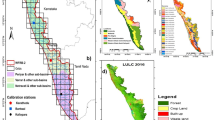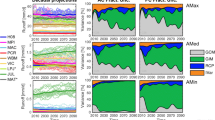Abstract
Formulation of sustainable development plans in the water sector requires reliable estimates of future hydrological conditions. The general circulation models (GCM) are usually used in the prediction of runoff in future periods but the predictions have large uncertainty. This study aimed to propose an approach for reducing the uncertainty of the results when using GCM models. To that end, the IHACRES hydrological model was first calibrated for the baseline period (1981–2005) in the Gharesu basin, Iran. The runoff corresponding to the GCM outputs of temperature and precipitation was then calculated in the historical period using the IHACRES. Twelve top GCMs suitable to the case study for the estimation of runoff were selected by the TOPSIS algorithm. The selected twelve GCMs were combined by the runoff hybrid approach (RHM), as an ensemble model, to reduce the uncertainty of hydrological modeling. The RHM model is formed by weighted integration of the calculated runoff based on the temperature and precipitation achieved from the selected GCMs. Results showed that the mean coefficient of variation (CV) of RHM was 0.76 and the uncertainty of runoff estimation by ensemble modeling was less than that of any single GCM. The RHM model under the RCP4.5 and RCP8.5 scenarios was used to predict runoff in the near future period P1 (2006–2030), mid-future period P2 (2031–2055), and far future period P3 (2056–2080). The annual runoff prediction for the Gharesu basin under scenario RCP4.5 showed an increase of about 1% in the near future period (P1), a decrease of -2.4% in the period P2, and a decrease of -10% in the period P3 relative to the baseline period. Runoff decreased by -7.8, -6.9, and − 1.9%, respectively, in periods P1, P2, and P3 under scenario RCP8.5. The results picture that the studied sub-basin of Karkheh will face more heavy rains and floods in the winter and will be drier than the past. That is an important alarm for water managers to adapte their management strategies.








Similar content being viewed by others
References
Abdulai PJ, Chung ES (2019) Uncertainty assessment in drought severities for the Cheongmicheon watershed using multiple GCMs and the reliability ensemble averaging method. Sustain (Switzerland) 11(16):4283. https://doi.org/10.3390/su11164283
Adib A, Mirsalari SB, Ashrafi SM (2021) Prediction of meteorological and hydrological phenomena in different climatic scenarios in the Karkheh watershed (southwest of Iran). Scientia Iranica 27(4):1814–1825. https://doi.org/10.24200/sci.2018.50953.1934
Ashofteh P-S, Bozorg-Haddad O, Mariño MA (2016) Performance Evaluation of a Developed Hybrid AOGCM Model under Climate Change. J Irrig Drain Eng 142(12):04016068. https://doi.org/10.1061/(asce)ir.1943-4774.0001107
Ashofteh P-S, Haddad OB, Mariño MA (2015) Risk Analysis of Water Demand for Agricultural Crops under Climate Change. J Hydrol Eng 20(4):04014060. https://doi.org/10.1061/(asce)he.1943-5584.0001053
Ashraf Vaghefi S, Mousavi SJ, Abbaspour KC, Srinivasan R, Arnold JR (2015) Integration of hydrologic and water allocation models in basin-scale water resources management considering crop pattern and climate change: Karkheh River Basin in Iran. Reg Envriron Chang 15(3):475–484. https://doi.org/10.1007/s10113-013-0573-9
Ashrafi SM (2021) Two-Stage Metaheuristic Mixed Integer Nonlinear Programming Approach to Extract Optimum Hedging Rules for Multireservoir Systems. J Water Resour Plan Manag 147(10):04021070
Ashrafi SM, Gholami H, Najafi MR (2020) Uncertainties in runoff projection and hydrological drought assessment over gharesu basin under CMIP5 RCP scenarios. J Water Clim Change 11(1S):145–163. https://doi.org/10.2166/wcc.2020.088
Axelsson C, Giove S, Soriani S (2021) Urban Pluvial Flood Management Part 1: Implementing an AHP-TOPSIS Multi-Criteria Decision Analysis Method for Stakeholder Integration in Urban Climate and Stormwater Adaptation. Water 13(17):2422
Bakhsipoor IE, Ashrafi SM, Adib A (2019) Water quality effects on the optimal water resources operation in Great Karun River Basin. Pertanika J Sci Technol 27(4):1881–1900
Coppola E, Giorgi F, Rauscher SA, Piani C (2010) Model weighting based on mesoscale structures in precipitation and temperature in an ensemble of regional climate models. Climate Res 44(2–3):121–134
Doulabian S, Golian S, Toosi AS, Murphy C (2021) Evaluating the effects of climate change on precipitation and temperature for iran using rcp scenarios. J Water Clim Change 12(1):166–184. https://doi.org/10.2166/wcc.2020.114
Esmaeili-Gisavandani H, Farajpanah H, Adib A, Kisi O, Riyahi MM, Lotfirad M, Salehpoor J (2022) Evaluating ability of three types of discrete wavelet transforms for improving performance of different ML models in estimation of daily-suspended sediment load. Arab J Geosci 15(1):1–13. https://doi.org/10.1007/s12517-021-09282-7
Esmaeili-Gisavandani H, Lotfirad M, Sofla MSD, Ashrafzadeh A (2021) Improving the performance of rainfall-runoff models using the gene expression programming approach. J Water Clim Change 12(7):3308–3329. https://doi.org/10.2166/wcc.2021.064
Farajpanah H, Lotfirad M, Adib A, Gisavandani HE, Kisi Ö, Riyahi MM, Salehpoor J (2020) Ranking of hybrid wavelet-AI models by TOPSIS method for estimation of daily flow discharge. Water Sci Technology: Water Supply 20(8):3156–3171. https://doi.org/10.2166/ws.2020.211
Fattahi P, Ashrafzadeh A, Pirmoradian N, Vazifedoust M (2022) Integrating IHACRES with a data-driven model to investigate the possibility of improving monthly flow estimates. Water Supply 22(1):360–371
Galavi H, Kamal MR, Mirzaei M, Ebrahimian M (2019) Assessing the contribution of different uncertainty sources in streamflow projections. Theoret Appl Climatol 137(1):1289–1303
Galavi H, Mirzaei M (2020) Analyzing uncertainty drivers of climate change impact studies in tropical and arid climates. Water Resour Manage 34(6):2097–2109
Hwang C-L, Yoon K (1981) Methods for Multiple Attribute Decision Making. In Multiple attribute decision making (pp. 58–191). Springer. https://doi.org/10.1007/978-3-642-48318-9_3
IRIMO (2019) IRIMO. Iran Meteorological Organisation. https://www.irimo.ir
Kamali B, Kouchi DH, Yang H, Abbaspour KC (2017) Multilevel drought hazard assessment under climate change scenarios in semi-arid regions-a case study of the karkheh river basin in Iran. Water (Switzerland) 9(4). https://doi.org/10.3390/w9040241
Lotfirad M, Adib A, Haghighi A (2018) Estimation of daily runoff using of the semi-conceptual rainfall-runoff IHACRES model in the Navrood watershed (a watershed in the Gilan province). Iran J Ecohydrology 5(2):449–460. https://doi.org/10.22059/IJE.2017.234237.614
Lotfirad M, Adib A, Salehpoor J, Ashrafzadeh A, Kisi O (2021) Simulation of the impact of climate change on runoff and drought in an arid and semiarid basin (the Hablehroud, Iran). Appl Water Sci 11(10):168. https://doi.org/10.1007/s13201-021-01494-2
Masih I(2011) Understanding Hydrological Variability for Improved Water Management in the Semi-Arid Karkheh Basin, Iran: UNESCO-IHE PhD Thesis. CRC Press
Moghadam SH, Ashofteh P-S, Loáiciga HA (2019) Application of Climate Projections and Monte Carlo Approach for Assessment of Future River Flow: Khorramabad River Basin, Iran. J Hydrol Eng 24(7):05019014. https://doi.org/10.1061/(asce)he.1943-5584.0001801
Mostaghimzadeh E, Ashrafi SM, Adib A, Geem ZW (2021) Investigation of Forecast Accuracy and its Impact on the Efficiency of Data-Driven Forecast-Based Reservoir Operating Rules. Water 13(19):2737
Nikakhtar M, Rahmati SH, Bavani ARM (2020) Impact of climate change on the future quality of surface waters: Case study of the ardak river, northeast of iran. J Water Clim Change 11(3):685–702. https://doi.org/10.2166/wcc.2019.132
Usman M, Ndehedehe CE, Farah H, Manzanas R (2021) Impacts of climate change on the streamflow of a large river basin in the Australian tropics using optimally selected climate model outputs. J Clean Prod 315:128091
Vetter T, Reinhardt J, Flörke M, Van Griensven A, Hattermann F, Huang S, Koch H, Pechlivanidis IG, Plötner S, Seidou O(2017) & others. Evaluation of sources of uncertainty in projected hydrological changes under climate change in 12 large-scale river basins. Climatic Change, 141(3), 419–433
Vyas JK, Perumal M, Moramarco T (2020) Discharge estimation using tsallis and shannon entropy theory in natural channels. Water 12(6):1786
Wada Y, Bierkens MFP (2014) Sustainability of global water use: Past reconstruction and future projections. Environ Res Lett 9(10):104003. https://doi.org/10.1088/1748-9326/9/10/104003
Wilby RL, Harris I(2006) A framework for assessing uncertainties in climate change impacts: Low-flow scenarios for the River Thames, UK.Water Resources Research, 42(2)
Zamani R, Akhond-Ali AM, Roozbahani A, Fattahi R (2017) Risk assessment of agricultural water requirement based on a multi-model ensemble framework, southwest of Iran. Theoret Appl Climatol 129(3–4):1109–1121. https://doi.org/10.1007/s00704-016-1835-5
Zamani R, Berndtsson R (2019) Evaluation of CMIP5 models for west and southwest Iran using TOPSIS-based method. Theoret Appl Climatol 137(1–2):533–543. https://doi.org/10.1007/s00704-018-2616-0
Zolghadr-Asli B, Bozorg-Haddad O, Enayati M, Goharian E (2021) Developing a robust multi-attribute decision-making framework to evaluate performance of water system design and planning under climate change. Water Resour Manage 35(1):279–298
Acknowledgements
The authors gratefully acknowledge support by the Shahid Chamran University of Ahvaz (SCU) through the grant SCU.C1400.31254.
Author information
Authors and Affiliations
Contributions
Hooman Gholami has gathered and downloaded the basic data, and developed and executed hybrid models under the supervision of Seyed Mohammad Ashrafi. Morteza Lotfirad has developed and executed AHP and post processing models under the supervision of Seyed Mohammad Ashrafi. Seyed mohammad Ashrafi has provided the basic idea of the research and supervised the research Also, wrote the main text of the paper. Moreover, Dr. Ashrafi obtained the funds from Shahid Chamran University of Ahvaz to perform the research. Seyed Mostafa Biazar has edited the text and some presentation materials. Professor Vijay P. Singh has edited the paper comprehensively, and supervised the research direction. All authors have read and agreed to the published version of the paper.
Corresponding author
Ethics declarations
Competing interests
The authors declare no competing interests.
Additional information
Publisher’s Note
Springer Nature remains neutral with regard to jurisdictional claims in published maps and institutional affiliations.
Rights and permissions
Springer Nature or its licensor holds exclusive rights to this article under a publishing agreement with the author(s) or other rightsholder(s); author self-archiving of the accepted manuscript version of this article is solely governed by the terms of such publishing agreement and applicable law.
About this article
Cite this article
Gholami, H., Lotfirad, M., Ashrafi, S.M. et al. Multi-GCM ensemble model for reduction of uncertainty in runoff projections. Stoch Environ Res Risk Assess 37, 953–964 (2023). https://doi.org/10.1007/s00477-022-02311-1
Received:
Revised:
Accepted:
Published:
Issue Date:
DOI: https://doi.org/10.1007/s00477-022-02311-1




